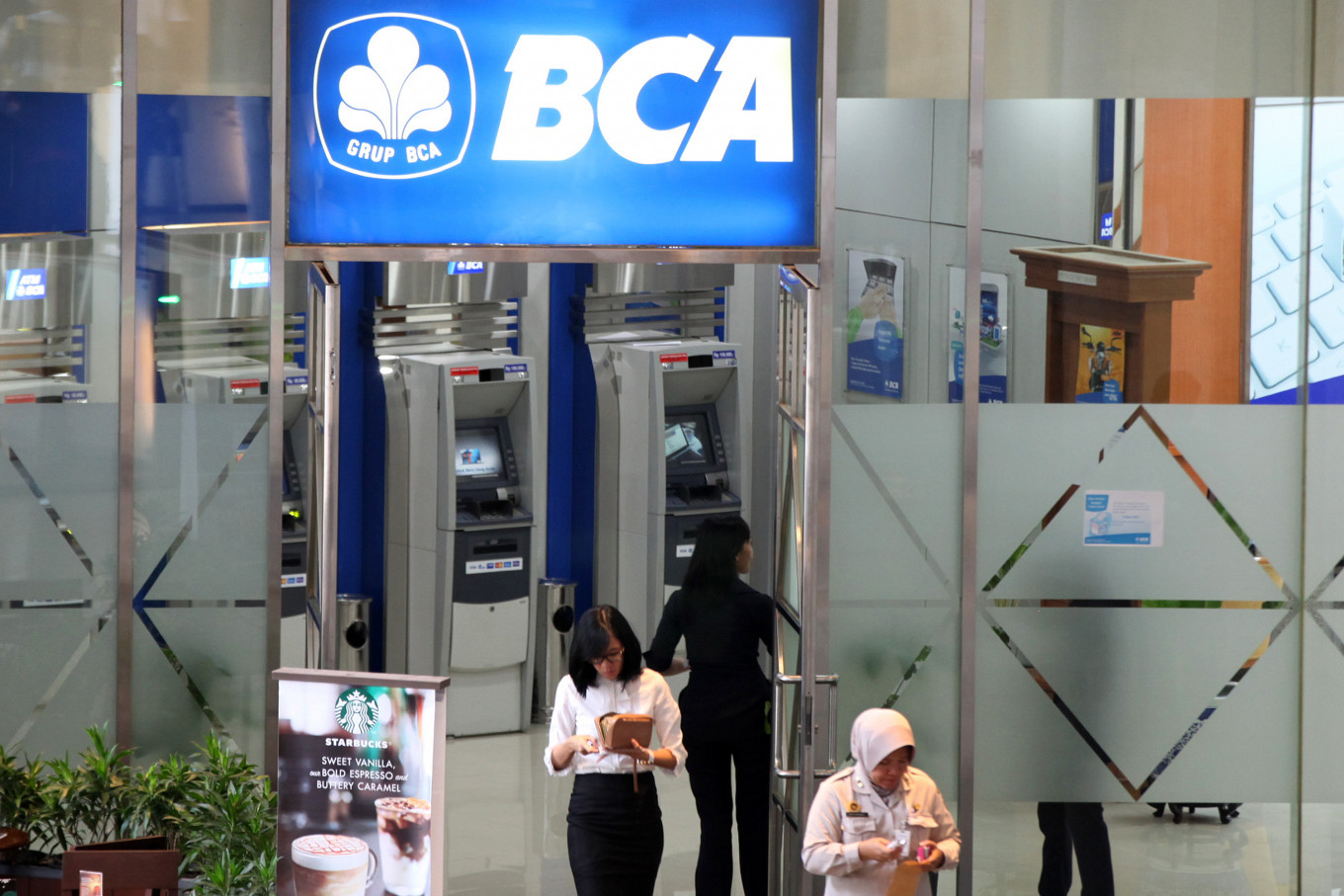Popular Reads
Top Results
Can't find what you're looking for?
View all search resultsPopular Reads
Top Results
Can't find what you're looking for?
View all search resultsBanking shares under pressure as investors avoid risk amid gloomy outlook
Artha Sekuritas Indonesia vice president Frederik Rasali said the outlook for banking shares was still gloomy as the prospect of lower earnings this year made the banking sector not so promising.
Change text size
Gift Premium Articles
to Anyone
B
anking shares are likely to remain under pressure as the financial authorities’ loan-restructuring program to help borrowers affected by the COVID-19 could affect their bottom-line, analysts have said.
Artha Sekuritas Indonesia vice president Frederik Rasali said the outlook for banking shares was still gloomy as the prospect of lower earnings this year made the banking sector not so promising.
As a result of uncertainties in the global and domestic economies, investors will continue to take a wait-and-see approach and hold on to their cash to reduce risk, he told The Jakarta Post on Tuesday. The lack of a mood for buying would affect stock trading as a whole, he added.
He said that if there was no strong recovery in the economy until the end of this year, banking shares would remain under pressure. If the pandemic ends in the next few months, bank performances would also improve as there should be an increase in lending, he added.
“The debt-restructuring policy actually puts more pressure on banks in terms of performance,” Frederik said. However, he noted that the policy measure had to be taken to ease the burden on borrowers impacted by the health crisis, many of whom might have lost their jobs or have seen their businesses closed down, resulting in the inability to pay off their loans.
Pilarmas Investindo Sekuritas research director Maximilianus Nico Demus expressed a similar view. He told the Post on Tuesday that despite the loan-restructuring policy possibly causing negative sentiment for banks, it was part of a strategy “to keep the economy running in order to reduce the impact of the coronavirus”.
In recent weeks, the index of the financial sector in the local stock exchange has fluctuated, Indonesia Stock Exchange (IDX) statistics show.
Last week between May 4 and 8, the financial index depreciated by 2.28 percent. The fall in the prices of banking shares also contributed to the fall in the Jakarta Composite Index (JCI), which lost 2.52 percent during the same period.
The previous week, between April 27 and April 30, the financial index gained 3.54 percent, while the JCI rose 4.9 percent, while between April 20 and 24 it fell by 6.03 percent and the IDX lost 2.99 percent.
According to Mirae Asset Sekuritas Indonesia's monthly strategy report published on May 8, the financial sector was among the “least preferred sectors during the outbreak”. The sector has dropped by 4.2 percent throughout April, although the JCI rose by 3.9 percent last month.
The share prices of big banks have been leading the fall this year. Bank Mandiri’s (BMRI) price nosedived by 48.26 percent, Bank Rakyat Indonesia (BBRI) plunged by 43.54 percent while Bank Central Asia (BBCA) lost 21.97 percent year to date (as of Tuesday).
Banks shares, particularly BBRI and BBCA were mostly sold by foreign investors during April, according to Mirae Asset’s report, adding that the foreign net sales in the financial sector reached Rp 4.3 trillion (US$289.4 million) during the month.
The total foreign fund outflows from Indonesian banking shares have amounted to a staggering Rp 11.39 trillion throughout 2020, leaving banking the sector with the largest foreign capital flight so far this year, Mirae Asset’s research data reveal.
The COVID-19 pandemic has severely weakened the operations of Indonesian banks, international credit rating agency Fitch Ratings has said. On March 24, Fitch revised its operating environment mid-point score for Indonesian banks to bb+ from bbb-, reflecting significant near-term risks to growth, asset quality and profitability in the sector.
The government, well aware that the current business climate poses a risk to bank profitability — as nonperforming loans (NPLs) will subsequently rise as people’s ability to pay their debts decreases — has rolled out a number of stimulus packages to prevent mounting bad loans.
In March, the Financial Services Authority (OJK) issued a regulation to relax debt quality assessments and restructuring requirements for loans of up to Rp 10 billion. OJK Regulation No. 11/2020 stipulates that banks are allowed to classify loans as good loans despite declining quality.
Paul Sutaryono, a banking observer and former assistant vice president of Bank Negara Indonesia (BNI), told the Post on Tuesday that although the loan restructuring was good for both borrowers and banks, it still held liquidity risks if the restructuring failed.
“If loans default, credit quality will go down thus the coverage ratio will go up. It could, therefore, eat up banks’ capital, hence the potential for liquidity risks,” he said.
OJK chairman Wimboh Santoso said on Monday in an online hearing with Regional Representatives Council (DPD) Commission IV that as of May 10, Indonesian banks had restructured the loans of 3.88 million borrowers, worth around Rp 336.97 trillion.
Wimboh said that 7.8 million borrowers with debts amounting to Rp 1.11 quadrillion might apply for loan restructuring.
The country’s banking industry recorded an NPL rate of nearly 2.8 percent in February, the highest since May of last year, although still below the 3 percent threshold.
The ratio of liquid assets to non-core deposits was 112.90 percent, well above the 50 percent threshold. The capital adequacy ratio, which measures a bank’s financial strength, was 21.77 percent, the OJK reported.










